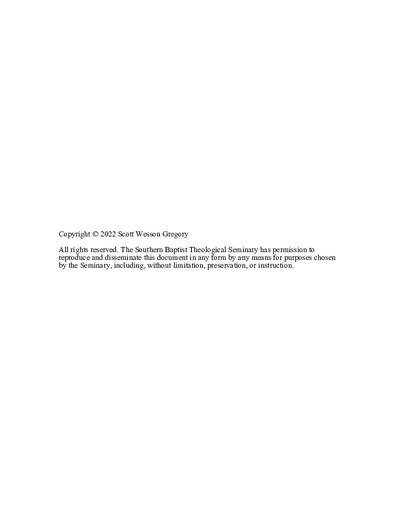| dc.contributor.advisor | Pennington, Jonathan T. | |
| dc.contributor.author | Gregory, Scott Wesson | |
| dc.date.accessioned | 2022-05-31T19:50:52Z | |
| dc.date.available | 2022-05-31T19:50:52Z | |
| dc.date.issued | 2022-04-29 | |
| dc.identifier.uri | https://hdl.handle.net/10392/6762 | |
| dc.description.abstract | Following the evangelists’ emphases in characterizing Jesus, a study of all four resurrection accounts reveals two major themes, namely, that Jesus is (1) the same person as before and (2) one with great and expanded authority. This thesis will focus on the latter point and seek to answer in what ways his authority is new. I will argue that the Risen Jesus’s authority is new (1) in that it is now “in heaven” as well as “on earth” (Matt 28:18; cf. Matt 9:6)—that is, that it is universal and global—and (2) in that he exercises new control over his body. After considering some of the implications for the body of Jesus, I will argue that these two points are related: Jesus’s universal authority which he exercises in his humanity, in heaven, and after the ascension is enabled by his resurrected body and the extraordinary power he has over it. | en_US |
| dc.subject.lcsh | Jesus Christ--Person and offices | en_US |
| dc.subject.lcsh | Jesus Christ--Resurrection | en_US |
| dc.title | The New Authority of the Resurrected Jesus in the Gospels | en_US |
| dc.type | Electronic thesis | en_US |
| dc.type | Text | |
| dc.type.qualificationname | Th.M. | en_US |
| dc.publisher.institution | Southern Baptist Theological Seminary | en_US |
| dc.publisher.department | School of Theology | |

